Valencian former footballer José ‘Pep’ Claramunt is one of the most legendary figures in Valencia CF’s history. He was renowned for his leadership as captain, technical skill, and tireless work in midfield. Born in Puçol, Spain, in 1946, Claramunt spent his career at Valencia CF, where he became a club icon throughout the 1960s and 1970s. Indeed, he played nearly 300 matches for the club. A dynamic and intelligent midfielder, he played a crucial role in Valencia’s Copa del Generalísimo (now Copa del Rey) triumph in 1967 and was a key player in the team’s successes during that era when Valencia CF won the 1970-71 LaLiga. Pep Claramunt was also coached by the great Alfredo Di Stefano at Valencia CF.
Playing in the Spanish league, in European competitions and as an international, Claramunt competed against iconic players like Johann Cruyff and Franz Beckenbauer. Indeed, Claramunt earned recognition on the international stage, representing Spain in over 20 appearances and he captained the national team a number of times too.
His vision, passing ability, and leadership made him a respected figure both at Mestalla and beyond. Even after his playing days, Claramunt’s legacy endures as one of Valencia CF’s greatest captains, embodying the spirit and dedication that define this historic football club. A local lad, he is still based in his hometown of Puçol (Valencia) and remains humble in person and refreshingly down-to-earth too.
24/7 VALENCIA: What have you made of Peter Lim’s reign as owner of Valencia? Has it been positive or negative?
PEP CLARAMUNT: Valencia was bankrupt and in desperate need of an investor when Lim took over. Sporting success depends on a number of factors…including the technical direction and the response of the players in any given season. There has been some success with the winning of the Copa del Rey in recent years as well as being finalists of that tournament and also qualifying for the Champions League, over a number of years, since Lim took over.
What did you make of Peter Lim’s daughter’s message to the fans: “The club is ours and we can do whatever we want with it and nobody can say anything“? Unfortunately, I think the tone of her words comes across as “off” to some people and it comes off badly (in print) and was seen as harsh and overly defensive by some people. However, I think that perhaps the words were taken out of context. Any son or daughter whose father is being criticized, a father who is investing a lot of their own money in something, is going to react and defend their father perhaps more with their hearts rather than just their heads. I don’t think she meant to sound so dismissive of Valencia CF and their fans, it was a personal reaction that was perhaps blown out of proportion by the media.
Can Valencia return to its best days under Lim? Valencia CF is a great club and it is in Lim’s interest that they do consistently well in the league and in Europe too, it’s good for his other businesses too as it is good publicity for him in general. He wants Valencia to do well. When I was a player at Valencia CF, there were epochs of winning Leagues and Cups but there were also periods when we were finishing merely 7th or 8th in La Liga. The current economic conditions of not being in Europe for the coming season are not favourable for Valencia CF at all… and are clearly factors to be taken into account too, in terms of Valencia’s capabilities for the current future.
Has the club ever recovered from Marcelino’s dismissal? His dismissal proved that nobody is indispensable at Valencia. Marcelino did a good job at Valencia but he didn’t believe in playing the youngsters of the ‘cantera’ like Soler and Ferran Torres in the first team that much. These players had proved themselves on an international level for the Spain (under 20’s) national side. They deserved to be playing in the elite on a club level but Marcelino didn’t want to give them much of a chance and the same goes for the Korean player Kang-In Lee, hardly playing at all for the first team. Peter Lim was investing in a team with the hope that players from Valencia’s academy coming up the ranks were going to be given a chance to play in the first team. But Marcelino didn’t see eye-to-eye with Lim about his vision, so there was a clash there… that grew over time. Marcelino stuck to his guns and Lim lost patience with the manager when he saw that Marcelino was not going to change his plans for the team and was becoming outspoken about it too.
Tell us a little about sharing a pitch with Johan Cruyff. How good a player was he? Cruyff was one of the greatest football players in the world and up there with Maradona, in my opinion. When I evaluate a truly great player, i always look at two things. That is, I look firstly at what they contribute individually as a player and, secondly, what they transmit to the club they play for. Like Messi, I feel that Cruyff has transmitted more to the clubs that he played for than even Maradona or Pele…even though they won more titles for their national teams
How important was Alfredo di Stefano in your career as a player? How good was he as a coach? Who could compare Coach Di Stefano to someone who works today? He was number one in the world as a player, attacking and going forward and getting back and defending and always with a “winning spirit”. He helped his teammates and would also cajole them and give them a good ticking off if needs be, thereby getting the best out of sometimes quite limited players.
As a manager, Di Stefano was someone who knew how to transmit his ideas. He chose me to lead the club (VCF) as captain for 3 years. He was a great motivator, whose “winner mentality” was very contagious for the team’s spirit and attitude. We didn’t really have great individuals at Valencia CF but Di Stefano made us into a great “bloque” (unit) and we won La Liga in 1970-71 and what is now called the ‘Copa del Rey’ (Copa del Generalissimo) in 1967 as well as reaching 3 Copa del Generalissimo finals during that memorable era. In terms of managers today, I would say Diego Simeone at Atlético Madrid would compare to Di Stefano in that he is a great motivator for his players, has a winners-takes-it-all mentality and is focused on the result being a victory for his team and is not bothered about how “well the team played” but is very much concerned with how effective they are in terms of trying to win the match.
Tell us a little bit about your match with Leeds United when you were a young player, especially that midfield! Johnnny Giles, Billy Bremner and Norman Hunter had a “tough” reputation – how did you feel about playing against them? Were there any memorable moments in front of them? They had a hard reputation and there was lot of physical contact and we played at night against Leeds. It had been rainy so the pitch was damp and the ball was faster, which suited my style of football perfectly…instead of the dryer pitches in Valencia because of the weather. I was a good dribbler and I had good ability on-the-ball so the faster pace of English football suited my style of playing. I always like the style of English football and the way they played, more physical and a faster rhythm too. I remember Norman Hunter’s influence in the matches but the player I remember most for Leeds was Jackie Charlton who was Bobby Charlton’s brother. He wasn’t the fastest of players but he was very strong and tall and Jackie made my life difficult on the pitch! He was an icon at Leeds and I understand that he played for Leeds for all of his club career. I can also see certain similarities regarding Leeds United and Valencia CF as clubs over the years…
How did that Leeds team compare to the other teams you played against in your career? Leeds were amongst the best of teams in Europe in that era. I always enjoyed playing the great English and German teams, for the way they played and also because the damp pitches allowed the ball to move faster, which suited my style of football!
Of course, there is now a strong Spanish influence at Manchester City – and you played against them on the old Maine Road. Mike Doyle and Colin Bell are City legends, how did you feel about playing against them? It was such a long time ago so I can’t say that it really stands out in the memory, I really can’t remember anything about the matches against Manchester City (over 2 legs of UEFA 1972). At that time, the great teams of England were Manchester United, Liverpool and Leeds. Now, with Guardiola as manager, Manchester City have become a great team ‘un grande’ as we say in Spanish. Guardiola knows how to implement & transmit his ideas regarding the concept of play, counter-attack and passing. If you combine this with the economic power they have and the titles they have won in the last decade, Manchester City are now one of the giants of Europe.
However, I do remember playing for Spain against England at Wembley in a European Championship qualifier in 1968. With 95, 000 people in attendance and some of the World Cup winners of the 1966 England team on the pitch… it was a memorable atmosphere. We were playing well and I remember the great Gordon Banks saving one of my shots on goal. We were holding out for a well-earned goalless draw to take back with us to Spain (as an advantage) for the second leg. Unfortunately, a Valencia teammate, Poli, fouled Bobby Charlton in the final minutes of the match. Charlton scored from a free-kick outside the box in the 83rd minute… and we lost 1-0 in London. By the time we played the second leg in Madrid, I was injured and couldn’t play at the Bernabéu. Spain lost 3-1 on aggregate to England over the 2 legs.
Would you put David Silva on the same level (or maybe higher) than the Doyle and Bell you faced? Would you have liked to see Silva return to Valencia? Silva has been key to Manchester City’s success over the 10 years he was there and has left his mark on English football, that is for sure. I have known Silva since he was a kid, playing for Valencia at ‘juvenil’ level and he is an extraordinary player who has been playing at a very high level of football for a long time now. He has great touch, his unique vision, his generous assists…they all reflect a player who has achieved not just great success at club level. He has won everything with Spain too, including the World Cup and the European Championship. I know that when he signed for Real Sociedad he returned ‘home’ in a way.
You also played Franz Beckenbauer against Bayern Munich. Was he as revolutionary a defender of the ball as your reputation suggests? Is there a player you can compare him to today? How much would Beckenbauer be worth in today’s transfer market? Very impressive. Beckenbauer was the best player in his position in Europe at the time. He played at a very high-level. Bayern Munich’s system of playing was designed for him. Yes, his way of playing was revolutionary for the time. Playing as a “sweeper” means he could almost play anywhere…he didn’t really have a fixed position and he was fantastic going forward, physically powerful and very swift in getting near the opponent’s box. No-one could compare to him now as the tactics are different and the game has changed and the system now played just does not make it possible to compare to that era. Perhaps Lothar Matthäus tried to replace him at Bayern Munich and for Germany… but he just didn’t have Beckenbauer’s speed or charisma on the pitch either.
What about you, are there any players – apart from Soler – that you can compare yourself to? Who are the midfielders you enjoy watching today? I don’t like to make comparisons as the football is different today compared to my era in the 60s/70s. In my day, you had more time to think on the ball, which suited my way of playing and there was less pressure on the ball. Modern football is faster and tactics and the style of play changes, depending on the manager.
Have you ever had any offers to leave Valencia? Was there ever any interest from England given their energetic style of play? I had offers from Real Madrid and FC Barcelona but I never wanted to leave Valencia. I wasn’t attracted to “the adventure” of playing elsewhere. I had my family and friends in my pueblo of Puzol, which is near Valencia and it was like having a home from home. My family come from the country, working on the land (“la huerta”) and we all grow up with a real sense of community. I was well-paid, playing at Valencia CF and winning some titles too. I had everything I needed in the pueblo and I was also playing for the Spanish national side so I didn’t feel like I was missing out at all. I have lived in the pueblo of Puzol (near Valencia) all my life and Mestalla is like a second home for me.
Tell us about the near signing of Cristiano Ronaldo to Valencia. How close was the deal? How lucky was Sir Alex to catch him? The true “Ronaldo” story is that, at the time, I was a technical secretary with Jesus García Pitarch and scouting for new players in Spain and abroad. I went to an international tournament in Toulon, France and there were teams like Brazil, Argentina and Portugal playing. I spotted Cristiano Ronaldo playing and just fell in love with his football and i could see his enormous potential as a footballer at the age of just 17 years of age. I contacted Valencia CF and told them that Ronaldo was a future number one player and that he was going to change the world of football… but they didn’t take my opinion into account. On top of that, Ronaldo’s representative Mendes did a pre-contract deal (which I have seen in writing as a document) with VCF presidential hopeful Paco Roig. The pre-contract deal stated that Ronaldo and Quaresma (a Portuguese winger) would be Valencia players if Paco Roig became elected as president of Valencia before May 30th of that year. Paco Roig had not even seen Ronaldo play in the flesh but he absolutely trusted Mendes’ opinion about him. It was pesetas in those days and Ronaldo was to be sold to Valencia for about 4 million euros and Quaresma for about 2 million euros in today’s currency.
Paco Roig didn’t become president so, after May 30th of that year, the pre-contract was dissolved. Despite my insistence, Valencia CF chose not to follow up on Cristiano Ronaldo. A few months later, Manchester Utd played Sporting Lisboa in a friendly and I believe that Alex Ferguson pretty much signed Ronaldo after that match in the summer! The one that got away…
Along with Ronaldo, who else could Valencia CF have signed? Tell us about seeing a young Didier Drogba in France… I saw striker Drogba and winger Malouda play when they were at Sochaux. I could see that they were both great players but, again, Valencia CF ignored my recommendations to buy them both. Drogba went on to great things at Marseille and even greater things at Chelsea. Malouda went on win Cups and leagues with Lyon and Chelsea and also represented the French national side.
Who was the best signing you did while you were technical secretary? It was Isco. I have been friends of Isco’s parents since he was a kid at Malaga. We brought him up to play a tournament in Moncada, Valencia. We signed him immediately, with his parents’ permission and Isco stayed on and developed as a player through the ranks at Valencia for a long time from that tender age. My intuition was that Isco had a very distinctive vision that was different from the other players. Isco is a very intelligent player and creative too. With that unique talent belies a certain fragility underneath; you have to really know the player and the person to get the best out of them. He was absolutely key in Real Madrid winning past Champions Leagues along with Ronaldo. Isco was the best player for Spain in the 2018 World Cup too. He has creativity and vision. Isco knows what his mission is, he puts himself in positions that are difficult to mark, he knows how to break the tactics of the opponent and cause them trouble by getting amongst their lines. A player of Isco’s calibre needs to be at peak fitness to be truly effective for the way they play football.
What has been the secret of Valencia CF’s success over the years in a very competitive league? Over the years, Valencia CF and Atlético Madrid have never been bothered about trying to imitate playing at the level of Real Madrid or Barcelona, which is just not possible. So… they use “their weapons” that they have, to get the result they need against those giants of Spanish football, which includes swift counter-attacks and having a really solid defense.
Interview by Will McCarthy
Article copyright ‘24/7 Valencia’
Related Post
This site uses Akismet to reduce spam. Learn how your comment data is processed.



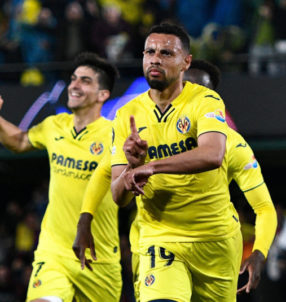
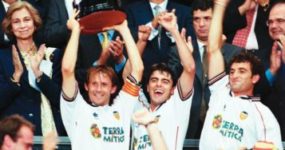
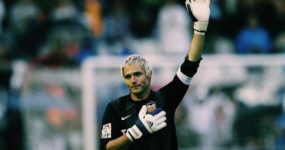
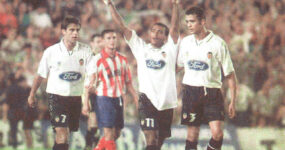
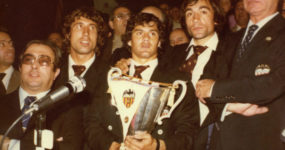

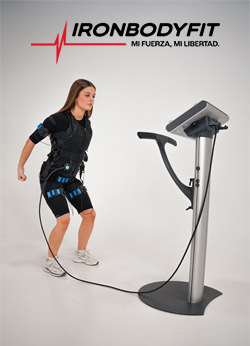
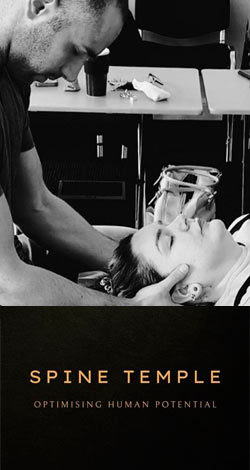















Leave a comment